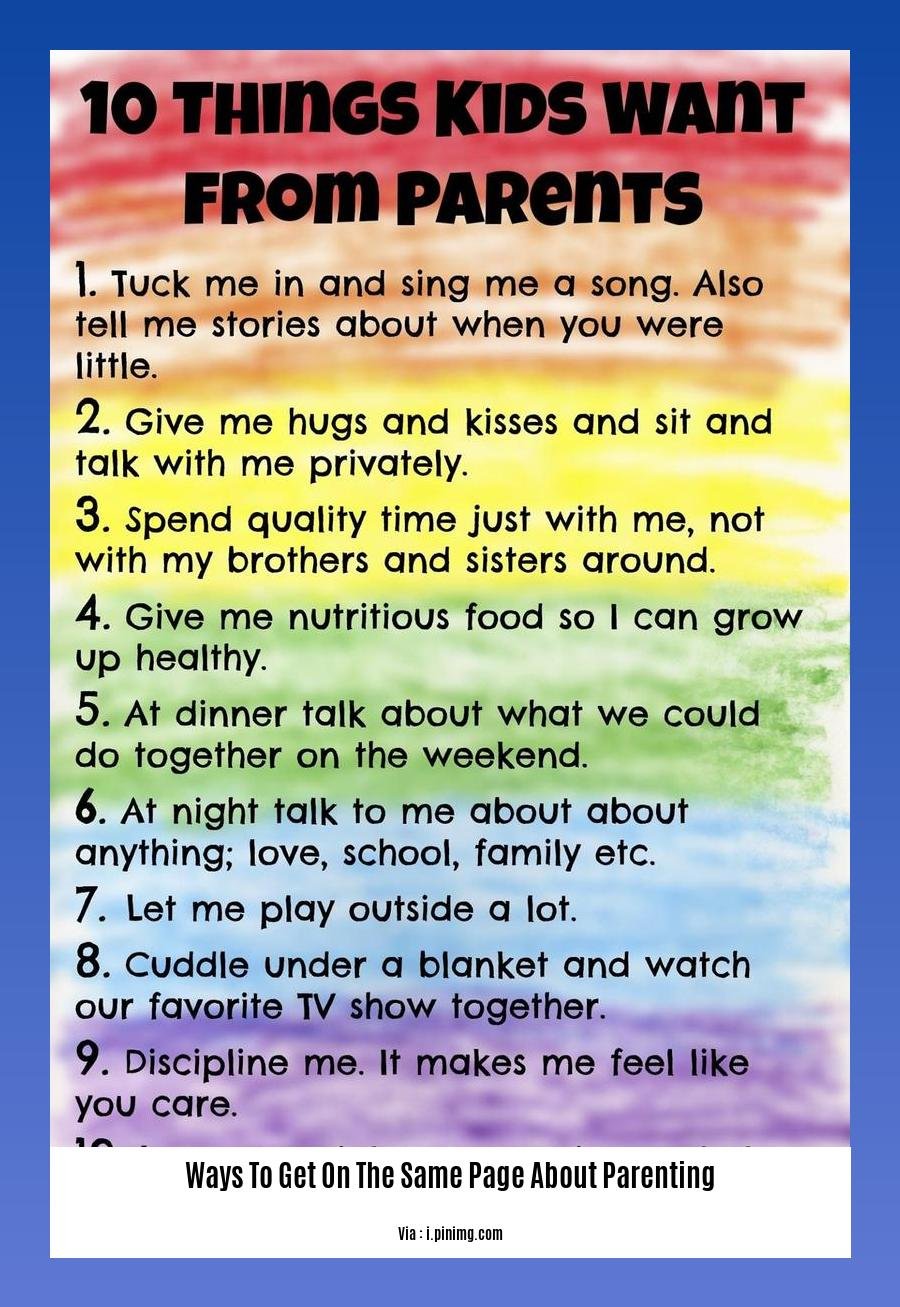Effective Ways to Get on the Same Page About Parenting
Effective parenting is crucial for a child’s well-being, but finding common ground can be challenging. In this article, [Insert Title Here], we’ll explore effective strategies to help parents get on the same parenting page and create a harmonious family environment.
Key Takeaways:

- You and your partner are a team united by a common parenting goal.
- Determine your shared priorities and focus on them when making decisions.
- Discuss different parenting strategies and find common ground.
- Highlight your shared values and goals to establish a basis for agreement.
- Acknowledge and address your differences while seeking compromise.
- Consider seeking professional support from family coaches, pediatricians, or behavior specialists when needed.
Ways to Get on the Same Page About Parenting
Getting on the same page with your parenting partner is crucial for creating a harmonious and supportive environment for your children. Here are some strategies to achieve this:
1. Recognize Your Partnership
View yourselves as a team working towards the common goal of raising healthy and happy children.
2. Identify Your Priorities
Discuss your individual priorities for parenting, such as discipline, education, and values. Aim to find common ground and respect each other’s perspectives.
3. Communicate Effectively
Talk openly about parenting strategies, challenges, and any differences you may have. Focus on finding solutions rather than engaging in confrontations.
4. Embrace Differences
Acknowledge that you may have different parenting styles and perspectives. Learn to accept and compromise, seeking to create a balanced approach.
5. Establish Boundaries
Set clear boundaries and expectations for each other, ensuring consistency and accountability in your parenting roles.
6. Seek Support When Needed
Don’t hesitate to seek professional help from family counselors, pediatricians, or behavior specialists if you experience challenges in aligning your parenting approach.
7. Practice Patience and Understanding
Parenting is a journey that requires patience and understanding. Give yourselves time to adjust, learn, and grow together as parents.
Learn how to have meaningful communication when making plans around parenting and family by exploring our guide on communicating around family planning and parenting choices. For couples looking to have children, discussing fertility and family desires is key. Read our article on how to discuss fertility and family desires in a relationship. Additionally, check out our tips for communicative decision-making around having kids to ensure that both partners are on the same page.
Actively Listen to One Another
Key Takeaways:
- Embrace empathy: Put yourself in your spouse’s shoes to understand their perspective.
- Avoid interrupting: Let your partner finish their thoughts before offering yours.
- Ask clarifying questions: Ensure you comprehend the message being conveyed.
- Paraphrase: Sum up your partner’s thoughts to demonstrate understanding.
- Avoid defensiveness: Approach discussions with an open mind and seek to understand, not argue.
Citation:
- Getting Parents on the Same Page by The Gottman Institute
Address conflicts respectfully
Disagreements are a natural part of co-parenting, but addressing conflicts respectfully is crucial for maintaining a healthy parent-child relationship and a harmonious household. Here’s how to approach conflicts respectfully:
- Delay discussions when emotions are high:
-
Intense emotions can cloud judgment. Hold off on discussing sensitive topics until both parents are calm and composed.
-
Focus on the children:
-
Remember that the well-being of your children should be the top priority. Avoid using them as pawns in parental conflicts.
-
Communicate openly and respectfully:
-
Engage in honest conversations about parenting beliefs, goals, and ideals while maintaining mutual respect. Avoid blaming or accusing each other.
-
Work together as a team:
- Approach parenting as a collaborative effort. Even with disagreements, support each other as co-parents.
Key Takeaways:
- Delay discussions during heightened emotions.
- Prioritize the children’s well-being.
- Communicate openly and respectfully.
- Collaborate as a team.
Relevant URL Source:
- Getting Parents on the Same Page by The Gottman Institute
Seek Professional Support if Needed
If your efforts to communicate and collaborate as parents are proving challenging, do not hesitate to seek professional support.
Family therapists and counselors can provide guidance, facilitate communication, and offer strategies for resolving conflicts. They can also help parents develop a shared vision for raising their children and establish a more harmonious parenting dynamic.
Key Takeaways:
- Recognize when professional support is necessary to improve parenting communication and dynamics.
- Family therapists and counselors can provide an unbiased perspective and offer expert guidance.
- Seeking professional help demonstrates a commitment to improving parenting skills and creating a healthier family environment.
Relevant URL Source:
- Family Therapy: When to Seek Professional Help

FAQ
Q1: How can parents work together as a team in parenting?
A1: Parents can collaborate by recognizing their shared goals, communicating openly and respectfully, and avoiding adversarial communication. They can also create written lists of expectations and consequences to ensure consistency in front of the children.
Q2: What are some strategies for resolving communication differences in parenting?
A2: Parents can focus on their similarities, learn to embrace their differences, and find ways to compromise. They can also engage in respectful communication, ask open-ended questions, and be willing to seek professional help when needed.
Q3: How can parents prioritize their goals and aspirations in parenting?
A3: Parents can pinpoint their priorities by identifying the most important aspects of parenting for each parent and discussing different parenting approaches to find common ground. They can also establish clear expectations and create written lists of consequences and parenting roles to ensure consistency.
Q4: What are the benefits of seeking professional help in parenting?
A4: Family coaches, pediatricians, or behavior specialists can provide tools and communication skills to help bridge parenting differences. They can also offer support, guidance, and facilitate constructive conversations between parents.
Q5: How can parents avoid heated discussions or attempts to correct each other’s parenting in moments of stress?
A5: Parents should delay conversations when emotions are high to avoid conflict. They can also focus on the children’s well-being and communicate a consistent message to prioritize the children’s needs and maintain a positive environment.










